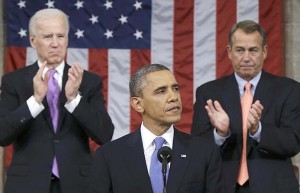Following up on a pledge made during his State of the Union address to “shift our cars and trucks off oil for good,” President Barack Obama is seeking Congressional approval for a $2 billion energy trust fund to support the development of advanced vehicle technologies.
The request could be a challenge to achieve considering the current, highly partisan situation in Washington, where even the military has fallen victim to Congressional gridlock. An earlier Obama Administration program focusing on battery propulsion was effectively shut down by Republican opponents after some high-profile problems.
The White House nonetheless hopes to sidestep the ongoing federal budget debate by promising the requested funding “would be set aside from royalty revenues generated by oil and gas development in federal waters of the Outer Continental Shelf.” That could be a salve to those who have demanded the White House continues to expand oil and gas drilling. There are already some signs of support from Republicans.
Obama will make his announcement during a visit to the Argonne National Laboratory, a major energy research center near Chicago.
The request will build on comments made during the State of the Union address, when the president said, “I propose we use some of our oil and gas revenues to fund an energy security trust that will drive new research and technology to shift our cars and trucks off oil for good.”
The president is now expected to say that the trust will be intended “to invest in breakthrough research that will make the technologies of the future cheaper and better — technologies that will protect American families from spikes in gas prices and allow us to run our cars and trucks on electricity or homegrown fuels,” according to a White House statement.
During the first Obama Administration, much of the emphasis was put on batteries and electric propulsion. Even funds already allocated to hydrogen fuel cell research was shifted away. In recent months, the Department of Energy has been expanding its focus and while batteries and battery cars would still be a central part of the trust, the program would also push for development of biofuels and compressed natural gas. CNG has been gaining momentum in recent months due to the wide availability of the fuel as a result of the so-called “fracking” boom.
The broader focus of the new trust fund appears to recognize that demand for battery-based vehicles, whether conventional hybrids, plug-ins or pure battery-electric vehicles, is growing much more slowly than proponents had anticipated.
The administration came into office calling for a $25 billion fund to support clean, high-mileage technologies with low-interest loans. After an initial spate of projects, some quickly souring, the spigot was closed and there have been no new loans made in over two years. Some existing loans, such as one for $529 million to Fisker Automotive, were halted mid-stream. That has put Fisker in a critical situation, the company expected to be sold or fail if it can’t range more cash. Others hoping for federal aid, such as California-based Next Auto, folded entirely.
Automakers continue to press for assistance in efforts to reduce emissions and meet higher mileage standards – the Corporate Average Fuel Economy, or CAFE, mandate rising to 54.5 mpg in 2025. Most manufacturers believe they cannot get to that figure without the use of battery power and other breakthroughs the new Energy Security Trust will target.
“The Energy Security Trust builds on this historic progress, continuing to increase momentum towards to a cleaner, more efficient fleet that is good for consumers, increases energy independence, and cuts carbon pollution,” said the White House.
Despite ongoing partisan bickering that has so far failed to resolve the so-called “sequestration” issue, the energy trust concept has been drawing a wide range of support. It is “an idea I may agree with,” Alaska Sen. Lisa Murkowski, the ranking GOP member of the Senate Energy and Natural Resources Committee, said after the president’s State of the Union address.


There’s that term “trust fund” again. A bad connotation in conjunction with anything associated with government: a taxpayer-funded debacle.
What, Sidney, you don’t trust trust funds?
Paul E.
Obama and the EPA are so removed from reality that it’s a disgrace.
First and foremeost we are NOT dependant on “foreign oil”. Oil companies buy oil from the Middle East because it is more profitable than selling oil from the U.S. which has enough oil to last the next ~500 years or more.
Secondly there is no current technology that is even remotely capable of allowing the U.S. to “get off of oil power” over the next 50 years and for good reason, because crude oil is cheap and practical whereas EVs are not, yet Obama and the EPA constantly push these models.
Fuel cell technology has potential as does Diesel but that is not what the funds are being targeted for. Obama wants to reward his crony political contributors as he has done in the past with millions in tax payer funded grants to fantasy companies – including a number of companies who took the money, paid it to the CEO and then filled bankruptcy.
Jorge, while I agree with a number of your points I also DO believe that we need to move away from the use of oil, imported or otherwise, at a reasonably rapid rate. I think the earlier funding of research programs wasn’t handled as well as it should have been — but better than political opponents would like us to believe. The reality is every other major automotive nation, Germany, France, Japan, China, Korea, is doing something similar. For us to pretend that we should take a classic laissez faire approach risks us losing out here much as we did on TVs, VCRs, etc…and while, yes, Apple is a major player in tablets and smartphones, its technology is still largely foreign-made.
Paul E.